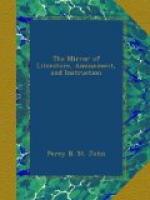As in eating, so in drinking, in the question of quantity—much depends on the capacity of the stomach. A very abstemious friend of mine, not long since, dined tete-a-tete with a gentleman well known for his kindness and hospitality, and not less so for his powers of bibulation. After dinner, at which a fair share of many excellent wines was taken, Port and Madeira were put on the table, and before the host, a magnum of Claret. My friend drank his usual quantum, three glasses of Madeira, during which time a great portion of the magnum had disappeared; and soon afterwards, being emptied, the host said, “I think we can just manage a bottle between us.” The bottle was brought, and very shortly disappeared, without the aid of the visiter.
The same gentleman and Lord ——, at the Angel at Bury, fell in with some excellent Claret. They had disposed of six bottles, when the landlord, who did not guess or gauge the quality of his customers (the bell being rung for a fresh supply,) begged very gently to hint that it was expensive stuff, being fifteen shillings a bottle! “Oh! is it so? then bring up two bottles directly!”
We have nothing, however, in modern times, at all equal to the account given of some of the ancients. The elder Cato, we are told, warmed good principles with a considerable quantity of good wine.[5] But Cicero’s son exceeds all others; so much so, that he got the name of Bicongius, because he was accustomed to drink two congii[6] at a sitting. Pliny, and others, abound in grand examples, that prove we have degenerated at any rate in this respect, for these convivials were neither sick nor sorry. Even that eminent debauchee, Nero, was only three times sick in fourteen years. “Nam qui luxuriae immoderatissimae esset, ter omnino per xiv. annos languit; atque ita, ut neque vino, neque consuetudine reliqua abstineret.”
The Abbe de Voisenon, a very diminutive man, said to his physician, who ordered him a quart of ptisan per hour, “Ah! my friend, how can you desire me to swallow a quart an hour? I hold only a pint.”
Wine has not only been considered good for the body, but has, from the earliest period, been thought invigorating to the mind. Thus we find it a constant theme of praise with poets. Martial says—
Regnat nocte calix, volvuntur biblia mane,
Cum Phoebo Bacchus dividit
imperium.
All night I drink, and study hard all
day;
Bacchus and Phoebus hold divided
sway.
Horace has done ample justice to it; and even Homer says—
The weary find new strength in generous wine.
Upon the principle, no doubt, of expanding the imagination, we find, so early as 1374, old Geoffrey Chaucer had a pitcher of wine a day allowed him. Ben Jonson, in after times, had the third of a pipe annually; and a certain share of this invigorating aliment has been the portion of Laureates down to the present day.




